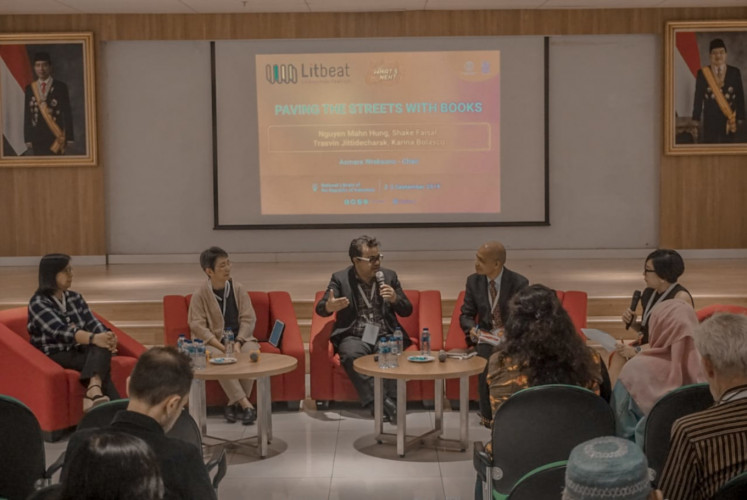Popular Reads
Top Results
Can't find what you're looking for?
View all search resultsPopular Reads
Top Results
Can't find what you're looking for?
View all search resultsBooks and bricks: Building cities with literature
When is it to be the turn of Jakarta or other cities in Indonesia to be counted as a World Book Capital and City of Literature?
Change text size
Gift Premium Articles
to Anyone
L
iterature is among the crucial elements for a city’s growth. UNESCO, for instance, initiates World Book Capital and City of Literature programs that highlight the importance of literacy to advance a city and generate sustainable urban development.
Malaysia’s capital Kuala Lumpur has been chosen as the 2020 World Book Capital, while in 2017 Bucheon city in South Korea became the first Asian country listed as a City of Literature.
With that in mind, when is it to be the turn of Jakarta or other cities in Indonesia to be counted as a World Book Capital and City of Literature?
Read also: Kuala Lumpur named World Book Capital 2020 by UNESCO
On Tuesday, the National Book Committee’s Litbeat Literaction Festival, a festival for book enthusiasts and the public, held a discussion entitled "Paving the Streets with Books" that discussed a similar topic, particularly how Indonesians could learn from the four panelists who have been striving to apply for the programs.
Taking place at the National Library of Indonesia, the discussion featured Sheikh “Shake” Faisal, publisher and honorary secretary of the Malaysian Book Publishers Association (MABOPA), Nguyen Manh Hung, founder of the Ho Chi Minh and Hanoi Book Streets, Maria Karina A. Bolasco, director of the Ateneo de Manila University Press (ADMU) in the Philippines, and Trasvin Jittidecharak, founder of Thailand’s independent publisher of English-language books, Silkworm Books.
During the discussion, Shake encouraged the audience to build connections with city halls instead of only focusing on collaborating with other literary associations. He added that most of the time the book industry in Malaysia connects to the Education Ministry.
Participating in a discussion at the Litbeat Literaction Festival on Sept. 3 at the National Library of Indonesia in Central Jakarta are (from left to right) Maria Karina A. Bolasco, director of Ateneo de Manila University Press in the Philippines, Trasvin Jittidecharak, founder of Thailand’s independent publisher of English-language books, Silkworm Books, Sheikh 'Shake' Faisal, publisher and honorary secretary of Malaysian Book Publishers Association, Nguyen Manh Hung, founder of the Ho Chi Minh and Hanoi Book Streets, and moderator Asmara Wreksono, managing editor of The Jakarta Post - Life. (Litbeat Literaction Festival/File)“But when we talk about the city and the development of people in the city, no one does better than City Hall itself […] and we had never knocked on their doors [before],” Shake said on Tuesday at the National Library of Indonesia in Central Jakarta. “For example, we have the Kuala Lumpur International Book Fair. It’s in Kuala Lumpur, [but] we’ve never invited Kuala Lumpur City Hall to be part of the book fair.”
Meanwhile, Vietnam has “reading streets” that serve as places for the public to read, gather with other bibliophiles and attend literary events. These streets are located in four cities, namely Ho Chi Minh, Hanoi, Vung Tau and Buon Ma Thuot. Hung said it’s important to build emotions among the readers to increase interest in reading. “[Reading streets] in Ho Chi Minh are more than 140 meters in length and we have 20 book stores – they’re more like showrooms. Every year we organize 200 events,” said Hung on the same occasion.
Read also: Litbeat Festival to boost collaborations among book, creative industries
Thailand's capital of Bangkok had been selected as the World Book Capital in 2013. Jittidecharak said it is important for a city to upgrade the libraries, not only the buildings and staff, but also the collections. “Most importantly, it should be a policy that you should have the budget to apply [for] new books every year,” Jittidecharak said.
The Philippines organizes a number of literary festivals, including the Taboan Writers Festival and the Cebu Literary Festival. Karina saw literary festivals as a way of advancing a city. “A city can be associated with a literary festival if you do it well enough and long enough,” Karina said.
Laura Prinsloo, head of the National Book Committee, told tempo.co that Jakarta has a strong foundation to apply to be a World Book Capital as the city has libraries, taman baca (reading areas), public forums and other international forums.
"Jakarta should be more active in strengthening its identity as a city of culture, literature and tourism," said Laura. (kes)












